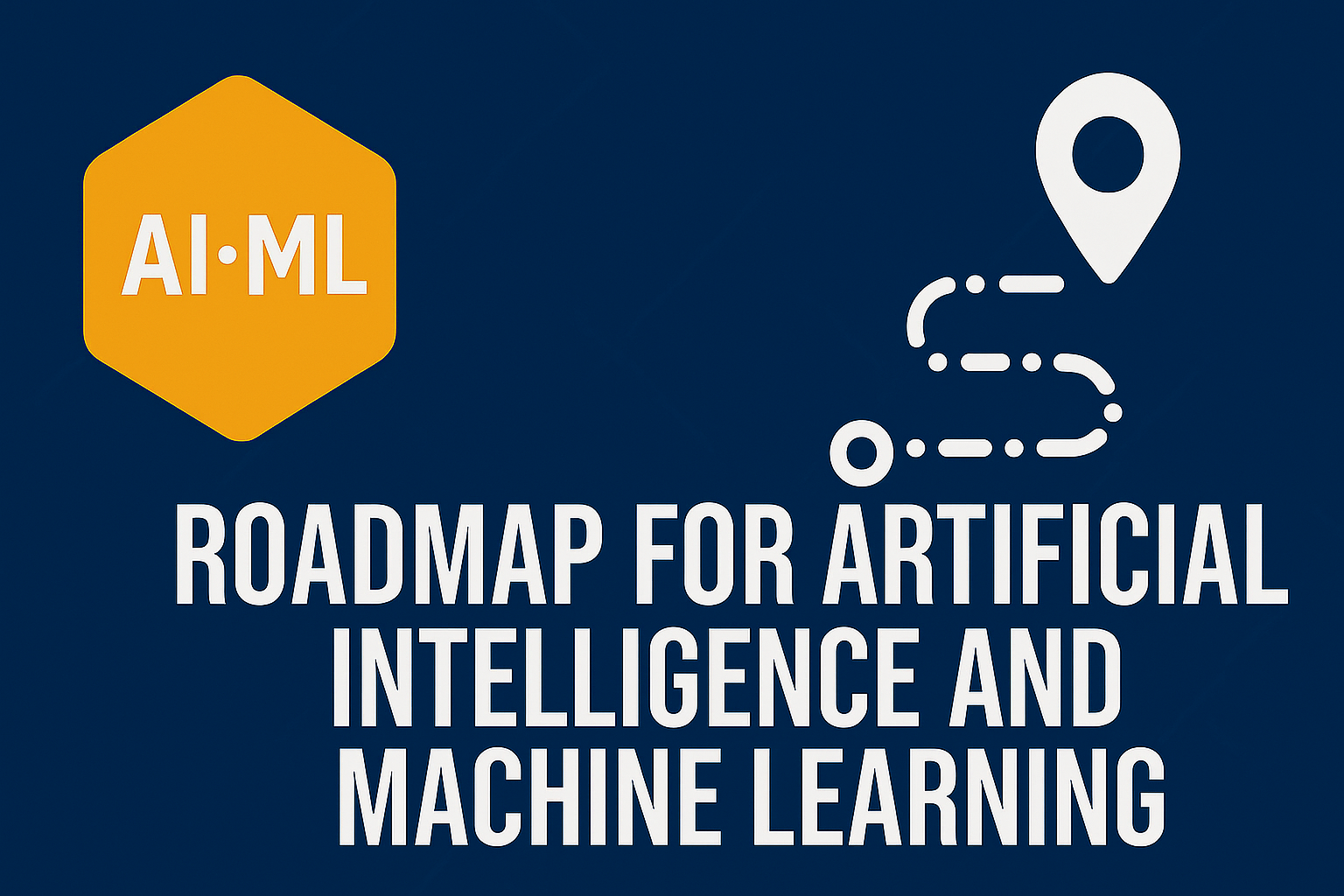
( The Resources are provided below every Topic, check them out to learn the Topics )
Introduction
Artificial Intelligence (AI) and Machine Learning (ML) are rapidly transforming how we live, work, and interact with technology. From self-driving cars and voice assistants to personalized recommendations and medical diagnostics, AI and machine learning (ML) are at the forefront of innovation. This blog post will walk you through the fundamentals, advanced concepts, real-world applications, and future trends, designed for beginners and professionals alike. Whether you’re just starting or deepening your knowledge, this guide covers everything you need to know about AI and M
1. What is Artificial Intelligence (AI)?
Artificial Intelligence, or AI, is the science of creating machines or software that can mimic human intelligence. This includes tasks like learning, reasoning, problem-solving, perception, and language understanding. AI can be categorized into:
- Narrow AI: Systems designed for a specific task (e.g., spam filters, voice assistants).
- General AI: A theoretical form of AI that can perform any cognitive function like a human.
- Superintelligent AI: A futuristic concept where machines surpass human intelligence in all aspects.
2. What is Machine Learning (ML)?
Machine Learning is a subset of AI that allows systems to learn from data and improve over time without being explicitly programmed. ML algorithms identify patterns in data and make decisions with minimal human intervention. It’s categorized into:
- Supervised Learning: Algorithms learn from labeled data (e.g., email classification).
- Unsupervised Learning: Algorithms find hidden patterns in unlabeled data (e.g., customer segmentation).
- Reinforcement Learning: Systems learn by receiving rewards or penalties for their actions (e.g., game-playing bots).
🧠 AI and ML Learning Roadmap
🔰 STAGE 1: Prerequisites (Mathematics + Programming)
📌 1.1 Mathematics for AI/ML
Understanding math is essential to grasp ML algorithms.
Topics to Learn:
- Linear Algebra (vectors, matrices, eigenvalues)
- Probability & Statistics (distributions, Bayes’ theorem)
- Calculus (derivatives, gradients)
- Discrete Math & Logic (optional but helpful)
Free Resources:
- Khan Academy – Linear Algebra
- Khan Academy – Probability and Stats
- 3Blue1Brown – Essence of Linear Algebra (YouTube)
- MIT OpenCourseWare – Single Variable Calculus
📌 1.2 Programming (Python)
Python is the dominant language for AI/ML.
Topics to Learn:
- Basics (variables, loops, functions, classes)
- NumPy, Pandas (data handling)
- Matplotlib, Seaborn (visualization)
- Git and GitHub (version control)
Free Resources:
- Python for Everybody (Coursera)
- Google’s Python Class
- W3Schools Python Tutorial
- Kaggle Python Course
📊 STAGE 2: Core Machine Learning
📌 2.1 Basics of ML
Understand how machines learn from data.
Topics to Learn:
- Supervised vs Unsupervised Learning
- Regression, Classification
- Overfitting, Cross-validation, Bias-Variance
- Model Evaluation (accuracy, precision, recall)
Free Resources:
- Google Machine Learning Crash Course
- Kaggle – Intro to Machine Learning
- Coursera – Machine Learning by Andrew Ng
📌 2.2 ML Libraries and Tools
Practice using powerful libraries.
Tools to Learn:
- Scikit-learn
- Pandas, Matplotlib
- Jupyter Notebooks
- Colab (online Python notebooks)
Free Resources:
🧠 STAGE 3: Deep Learning
📌 3.1 Neural Networks
Understand how multi-layered models work.
Topics to Learn:
- Perceptrons, Activation Functions
- Feedforward Neural Networks
- Backpropagation, Loss Functions
- Gradient Descent & Optimization
Free Resources:
- DeepLearning.AI Deep Learning Specialization (Auditable on Coursera)
- Fast.ai Deep Learning Course
- Neural Networks from Scratch – YouTube
📌 3.2 Deep Learning Frameworks
Get hands-on with real tools.
Learn:
- TensorFlow
- PyTorch
- Keras
Free Resources:
🗣️ STAGE 4: Specialized Fields
📌 4.1 Natural Language Processing (NLP)
Topics to Learn:
- Text preprocessing, Tokenization
- Word Embeddings (Word2Vec, GloVe)
- Transformers (BERT, GPT)
- Sentiment Analysis, Chatbots
Free Resources:
📌 4.2 Computer Vision
Topics to Learn:
- Image classification, Object Detection
- CNNs (Convolutional Neural Networks)
- OpenCV basics
- Image segmentation, GANs
Free Resources:
🚀 STAGE 5: Advanced Topics & Projects
📌 5.1 Advanced Topics
- Reinforcement Learning
- Explainable AI (XAI)
- AI Ethics & Fairness
- Edge AI & TinyML
Free Resources:
📌 5.2 Build Projects
Apply knowledge by building:
- Movie recommendation system
- Spam classifier
- Object detection app
- Chatbot using Transformer models
Free Platforms to Practice Projects:
✅ BONUS: Communities & Practice
- Kaggle – Data science competitions & datasets
- Stack Overflow – Get help with coding errors
- Reddit (r/MachineLearning) – Discussion & trends
- AI/ML Discord & GitHub – Join real projects
